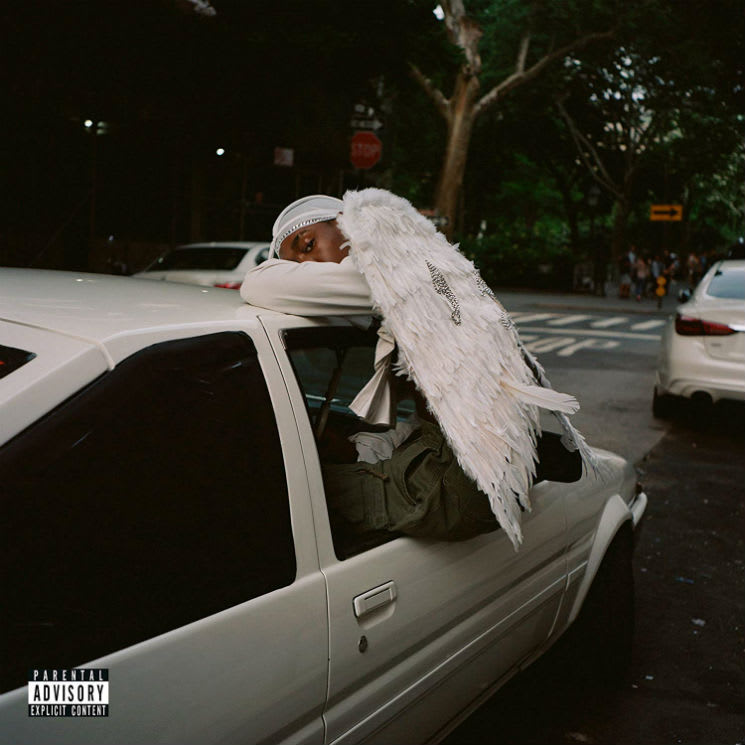Ascribing authorship and meaning are music critics' bread and butter, so it's a bit of a stick in the eye when artists go out of their way to avoid both. Case in point: Blood Orange, aka Dev Hynes.
The line on Hynes' beautiful, beguiling new album, Negro Swan, is that it explores depression and anxiety through a queer/person-of-colour lens. But Hynes says that's just what it means to him.
When he handed the tracks off — everyone from Porches' Aaron Maine to Puff Daddy contributes — he let his collaborators take the reins, in terms of both their performance and their interpretation of the material. Fittingly (and somewhat frustratingly) Hynes doesn't consider the finished songs his own; he's just the glue that holds them together. As for their meaning, that's up to whoever's listening.
So how are listeners supposed to interpret that? Some would argue you don't: just lose yourself in the experience of listening. And it is an experience — nothing about Negro Swan, a far looser record than 2016's Freetown Sound, is obvious. Borrowing sounds from pop, R&B, hip-hop, jazz and indie rock, Hynes avoids consciously referencing any of their tropes, leaving the hooks and grooves to reveal themselves over repeated listens.
It helps that each of his collaborators bring their A-game. A$AP Rocky's verse on "Chewing Gum" is a highlight, while Steve Lacy delivers one of the record's more memorable grooves on "Out of Your League." But none seem to have made as strong an impression on Hynes as author and transgender activist Janet Mock. Peppered between several of the record's tracks, she shares her own thoughts and memories evoked by the music in short, spoken word sound bites. In one, she discusses the power of certain images; in another she offers her definition of family. As the only voice other than Hynes' heard more than once across the record, she's the closest thing we have to an outside narrator, telling us how to think and feel about the music. Yet, even here we're left wondering if she's a proxy for Hynes, or an alternative voice.
It's tempting to pretend that art is unequivocal: that there's one true creator and meaning behind each piece. Absent that, it's easy to fall back on cheap critical shorthand with records like this. Much like Frank Ocean's Blonde, it doesn't offer the immediate thrills of its predecessor, even as it stays true to and advances the artistic vision of its creator. It's messy and full of ideas, clarity be damned.
After immersing myself in Hynes' world for the better part of a week, what I think Hynes seems to be saying is that no matter how you listen, being a Blood Orange fan means having to put in some work. Intentionally or not, Hynes has surreptitiously convinced listeners to deeply engage with his art; we're digging for the grooves, searching out the hooks while questioning our own habits and assumptions, as we look for our own meaning in the music. And there's plenty in Negro Swan.
(Domino Recording Company)The line on Hynes' beautiful, beguiling new album, Negro Swan, is that it explores depression and anxiety through a queer/person-of-colour lens. But Hynes says that's just what it means to him.
When he handed the tracks off — everyone from Porches' Aaron Maine to Puff Daddy contributes — he let his collaborators take the reins, in terms of both their performance and their interpretation of the material. Fittingly (and somewhat frustratingly) Hynes doesn't consider the finished songs his own; he's just the glue that holds them together. As for their meaning, that's up to whoever's listening.
So how are listeners supposed to interpret that? Some would argue you don't: just lose yourself in the experience of listening. And it is an experience — nothing about Negro Swan, a far looser record than 2016's Freetown Sound, is obvious. Borrowing sounds from pop, R&B, hip-hop, jazz and indie rock, Hynes avoids consciously referencing any of their tropes, leaving the hooks and grooves to reveal themselves over repeated listens.
It helps that each of his collaborators bring their A-game. A$AP Rocky's verse on "Chewing Gum" is a highlight, while Steve Lacy delivers one of the record's more memorable grooves on "Out of Your League." But none seem to have made as strong an impression on Hynes as author and transgender activist Janet Mock. Peppered between several of the record's tracks, she shares her own thoughts and memories evoked by the music in short, spoken word sound bites. In one, she discusses the power of certain images; in another she offers her definition of family. As the only voice other than Hynes' heard more than once across the record, she's the closest thing we have to an outside narrator, telling us how to think and feel about the music. Yet, even here we're left wondering if she's a proxy for Hynes, or an alternative voice.
It's tempting to pretend that art is unequivocal: that there's one true creator and meaning behind each piece. Absent that, it's easy to fall back on cheap critical shorthand with records like this. Much like Frank Ocean's Blonde, it doesn't offer the immediate thrills of its predecessor, even as it stays true to and advances the artistic vision of its creator. It's messy and full of ideas, clarity be damned.
After immersing myself in Hynes' world for the better part of a week, what I think Hynes seems to be saying is that no matter how you listen, being a Blood Orange fan means having to put in some work. Intentionally or not, Hynes has surreptitiously convinced listeners to deeply engage with his art; we're digging for the grooves, searching out the hooks while questioning our own habits and assumptions, as we look for our own meaning in the music. And there's plenty in Negro Swan.
